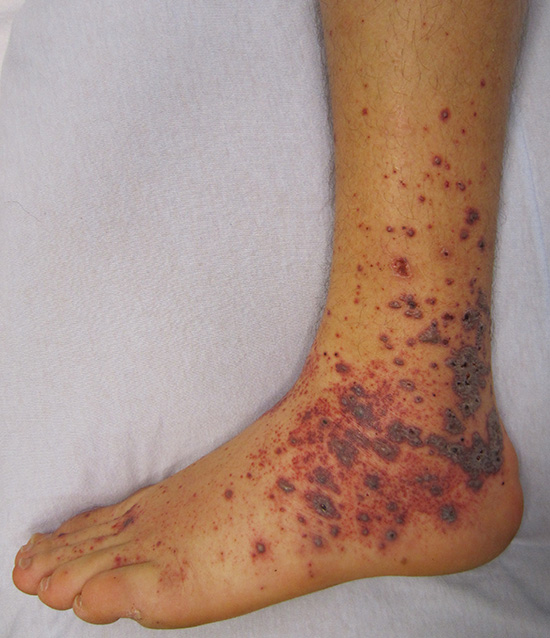Sun Allergy
Although some evidence indicates a sun allergy can be inherited, the actual causes for sun allergies haven't yet been determined. I know it sounds strange, I mean who would ever think of being allergic to the sun?! Here is how you can prevent and treat the symptoms naturally.
One of the triggers for an allergic reaction to the sun seems to be any change in sun-exposed skin. What this means is that the chemical makeup of the skin has been altered and so when the sunlight interacts with your skin, a rash develops.
This can happen through illness, which changes the chemistry of the body, through exposure to chemicals or fragrances, or from ingesting medications or herbs that can increase sensitivity to the sun.
For example, a person with sensitive skin may experience a sun allergy rash reaction if she has applied sunscreen to her skin or has started a round of antibiotics or herbs. The body's immune system is triggered and the skin reacts.
Some people with sun sensitivity also have similar reactions to indoor fluorescent lighting.
Symptoms of Sun Allergy
The symptoms of sun allergies can vary from person to person, depending on the severity of the allergic reaction. Most often, a person will develop a red rash on the back of the neck, the back of the hands, upper chest, the lower legs, and surface of the arms.
The rash is itchy and uncomfortable and seems to come out of nowhere. Sometimes bumps or scaly spots develop on the skin. At the far end of the spectrum, a person who is severely allergic can develop hives or large blisters on the skin not only in exposed areas, but under clothing too. Yikes!!
There are rare cases of an allergic reaction occurring after just a few minutes in the sun, but typically a reaction would be seen after about two hours of sun exposure.
Preventing a Sun Allergy Rash

Your physician will conduct tests to determine what type of sun allergies you may be experiencing. Sometimes, it's as simple as discontinuing use of a specific lotion or sunscreen. Natural treatment for this type of skin allergy begins with preventive measures.
- Wear protective clothing; preferably long pants and long-sleeve shirts, along with a hat featuring a wide brim to help protect your neck too.
- Don't go outside without applying sensitive skin sunscreen with a minimum of 20 SPF and a lip balm with sunblock of at least SPF 20.
- Check the ingredients in the products you are using on your skin, hair, and body, to be sure they do not contain allergy producing ingredients.
This is a bit more complicated than it sounds, since most every brand of hypoallergenic products I have researched contain chemicals which can cause skin irritation or allergies. I've only found one brand of truly safe hypoallergenic products that contain no plant allergens, no irritating chemicals, and are also rated as safe by the Environmental Working Group.
For more help with this, please see our Safe Cosmetics Guide. - Sunglasses with UV protection are a must!
- Try to avoid direct sunlight at peak hours of the day.
- Eating lots of fresh fruits and vegetables that contain health producing antioxidants will help your skin to reduce inflammation and breakouts.
- Some herbs such as St. John's Wort can increase sun sensitivity, so it is important to be careful to limit sun exposure while you are taking it.
- Medicines and oral contraceptives can also trigger an allergic reaction to the sun, so try to be aware of the prescriptions you're taking in relation to a possible reaction. Products used directly on the skin should be carefully monitored as well.
Home Remedies for Sun Allergies
Natural home remedies for sun allergies can bring relief, especially if your symptoms are mild. Please always remember to do a skin test FIRST, even before using natural home remedies.
Remember that even natural skin care remedies can provoke an allergic reaction, so always go slowly when trying anything new.
- If you get a sun allergy rash or bumps, try cold compresses for mild symptoms.
- Milk - soak a soft clean cloth in milk and gently dab on affected areas. This is of course only if you are not allergic to milk!
- Aloe Vera Mixture - Mix together 1/3-cup aloe Vera gel, 1-teaspoon lavender oil, 1-teaspoon apple cider vinegar, and oil from several Vitamin E capsules - apply onto affected areas
- Baking soda - soak in a tub of lukewarm water with one cup of baking soda added
- Oatmeal - reduces the itching and inflammation
- St. John's Wort - even physicians recognize the effectiveness of this natural home remedy. Dilute St. John's Wort extract with nine parts water. Apply to the affected areas.
- If these don't work, or you have more severe symptoms, your physician may recommend an over-the-counter antihistamine or prescribe a stronger medication, phototherapy, PUVA (light treatment), or beta-carotene tablets.
Weather and Sun Allergies
Climate can have quite an affect on sun allergies! Temperate climates can be the best for people with sun allergies because the skin doesn't seem to react all year round.
For those living in a tropical climate or those who live at a higher altitude where the sun is much closer and therefore more intense, it's possible that your symptoms could last year round.
Traveling With Sun Allergies

Sun allergies can be a real concern when you are traveling, because a large portion of the world has a tropical climate, (which I absolutely love by the way!)
If you have a sun allergy you may have more difficulty traveling to more tropical locations, which include many Caribbean Islands, parts of South America such as Brazil and Peru, central Africa, India, and parts of Asia, Australia and the Middle East.
You may be able to create some reasonable accommodations for yourself if you are traveling in these beautifully sunny locations such as:
- Bring plenty of your own brand of sunscreen, one that your skin does not react to, so you don't end up needing to buy a brand that may not work well for your sensitive skin!
- With a sun allergy, you'll want to keep yourself as healthy as possible, so be sure to bring the supplements and other health supports that work for you. Traveling can be stressful!
- Bring plenty of wide brimmed hats, long sleeve shirts, light scarves. Be aware of the culture and customs of the area you are traveling to, for example in some countries women do not wear pants.
- Some tropical countries have local clothing options that may work for you. Think saris in India ... beautiful, long, flowing garments that keep you cool and cover your skin!
Home > Common Allergies and Symptoms > Sun Allergy









New! Comments
Share your thoughts about what you just read! Leave me a comment in the box below.